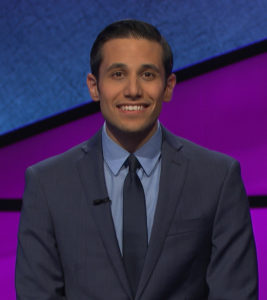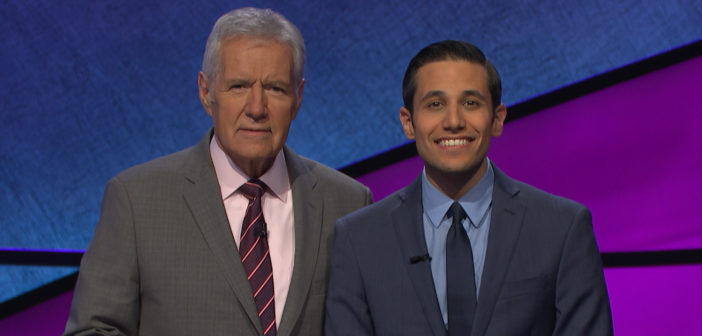Mr. Frank Orlando, political science instructor, and director of the Saint Leo University Polling Institute competed on “Jeopardy.” The episode, which aired Jan. 17, was viewed nationwide, and there was even an on-campus watch party in TECO Hall, where students and faculty members cheered Orlando on.
This was not the first time Orlando competed on a televised game show or even a version of “Jeopardy.” Three years ago, he was a contestant on “Sports Jeopardy,” which aired on NBC Sports Network and can be viewed on Crackle.
“I’ve been on ‘Sports Jeopardy’ before, which is basically the same show, but the questions are all based on sports, and it’s a different host. It’s not Alex Trebek. It’s this guy named Dan Patrick, who is a sports commentator,” said Orlando.
Though his first time on the original “Jeopardy,” he most likely will not return to the show as a contestant because a rule exists that contestants are not allowed to reapply for the show. Jeopardy only requests contestants to return to the show in special cases, such as the “Tournament of Champions.”
Nevertheless, Orlando beat the odds because the chances of getting onto “Jeopardy” are pretty slim. He said roughly of the 100,000 people who apply online, only 4,000 make it to the second round, and only 300 to 400 people make it onto the show.
The application process, which he described as “very difficult” and “a long process,” starts with an online test, which is usually in the spring. It has 50 questions, and contestants get 15 seconds to answer each question.
“Usually, you need in the 40s out of 50 right. You don’t know how you do because they don’t tell you the answer… but… people will screen grab their screen from taking the test, and then go through and figure out the answers,” said Orlando.
A high score in the 40s will qualify for the next round. The show emails those who qualify, instructing them to participate in the second round, which is in-person. There are roughly 10 to 12 different cities in which a person can compete in the second round. Orlando did not have to travel far since one of the cities last year was Tampa.
He said the second round is where the show interviews applicants to learn more about them, such as interesting facts and their desires for the money, and they also proctor the applicants taking the test. Once again, they have 15 seconds to answer questions that appear on the screen.
“You do a little bit of gameplay; so, you practice the game, and they make sure you are capable,” said Orlando.
Afterward, applicants are told if they made it into the contestant pool, where they can remain for 18 months, and if the show doesn’t contact them within that time frame, then the applicants return to the first step of the process by taking the online test again.
Orlando continued to explain his own application process.
“I took the test last year online in March,” he said. “The middle of May was the in-person, which was really fun. And then, I kind of forgot about it other than my family members being like ‘any word from ‘Jeopardy.’”
He had doubts of advancing to the live show, but at the end of October, he received a phone call informing him he did advance. He had mixed feelings of getting the news.
“I didn’t really know what to think because I was super excited, but also I was like ‘I’ve got to get down to business here.’ It’s a good thing to get on the show, but it’s like you want to win,” said Orlando. “So, it was a mixture of excitement but also apprehension … I don’t know if anyone is really ready.”
Additional pressure came because filming was the week after Thanksgiving, so he only had four weeks to prepare. However, he engaged in a systematic approach to studying in the little time he had.
“I tried to be as analytical as possible. The first thing I did was to see how well I was doing, and I used a website called Jarchive,” said Orlando. “It has every question from the show; people update it every day.”
Orlando went through each board and coded the questions based on the topic. He broke down topics into geography, history, politics, music, literature, art, television, film, science, math, etc. He then tested himself to see how many he knew in each of those categories, giving himself two or three seconds because on the show contestants have to answer quickly.
After roughly two weeks’ worth of these self-tests, he determined the categories he excelled in, which were history, geography, politics, music and sports. He got 80 to 90 percent of these questions right. So, he spent the remaining time studying other topics, such as literature and art, by using reference books and encyclopedia passages, with information with famous authors and classical works of literature. Looking back, he believes it would have been better to start studying during the summer rather than during the semester when he was really busy.

He got his double daily double, which he thought was easy. However, he didn’t do a true daily double; he didn’t out of fear of getting the question wrong. Photo Provided by Sony
Another challenge he faced was fitting the filming with his work responsibilities. Jeopardy’s filming schedule conflicted with his work schedule.
“Jeopardy’s” structure is consistent. They film on Tuesday and Wednesday, five episodes a day. So, every week viewers watch Jeopardy is one day of filming. They film the first three episodes in the morning, followed by lunch, and then the fourth and fifth episodes after lunch. Contestants have to arrive Tuesday morning at 7 a.m. and remain there until Wednesday afternoon.
“I came back on Wednesday night–red-eye–I left there at like nine or ten at night, and I got to Orlando at like five in the morning, and then, I taught a class an 8 o’clock,” he said. “So, I taught on Monday. I missed Tuesday and Wednesday, but then I taught a class Thursday starting at 8 a.m.”
He also mentioned that the show does not pay for contestants’ flight or hotel stays, but they give six tickets for supporters, which his father and sister came to support him. However, the cost of the flights is offset by the prize money, but the prize money check it is not received until two weeks after the episode airs.
In hindsight, Orlando said he would have studied more contemporary art and current news; he also would have worked on his buzzer skills.
“So, I think I would have maybe done a little more on current events. Also, I think I would have tried to figure out a way to work on my timing. It’s tough to do unless you are actually on the show unless I could have figured out how to get the buzzer timing,” said Orlando.
In “Jeopardy,” a contestant is not able to buzz before the question is completely read by Alex Trebek. There is a person whose job it is to open up the buzzer system, so when the question is asked, the person pushes the button, and lights turn on. When the lights turn on, the contestants can buzz in.
“If you buzz in before the lights turn on, you get locked out for a quarter second, and if you get locked out, the other people are going to be buzzing before you,” said Orlando.
During the show, Orlando started off buzzing on time, but after another contestant buzzed in before him, he tried to anticipate the end of the question and got locked out for a few of the questions because he buzzed before the light turned on.
Orlando said he knew most of the answers. He said it’s a two-part thing: figuring the answer out and getting ready for the buzzer. So, he had problems with the timing.
“I wasn’t listening to Alex read the questions at all. I mean no one does. You can read faster than you can listen to a guy reading the questions,” he said. “So, I am reading as is everyone. You read, figure it out and prepare yourself for the buzzer. John, the guy who won, got into a rhythm.”
In the end, he answered 16 right and one wrong, and he was in second place for the majority of the episode but came in third due to the final “Jeopardy” question. Despite losing, Orlando thinks that no matter what people say, like his buzzer performance, it doesn’t hurt the reward of being on the show.
“The value of getting on the show was for my own edification. It was for me to achieve something that I wanted to achieve. No reaction from other people could change the accomplishment that I wanted,” said Orlando.





